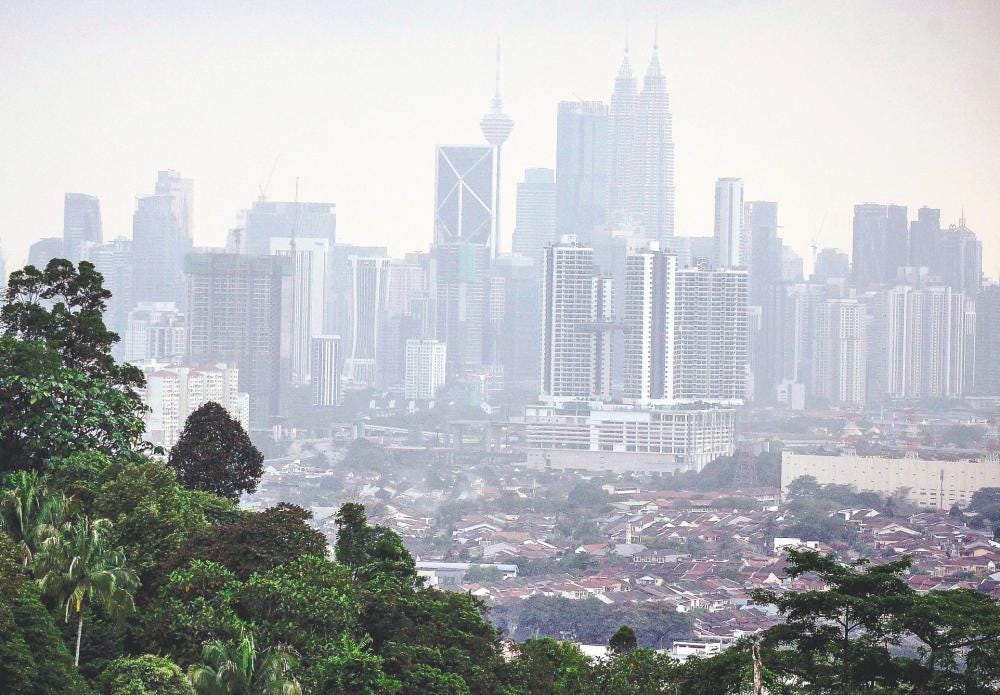Every year, Malaysia becomes inundated with haze. This year has been particularly bad with the Air pollution Index (API) reaching over 300 on numerous occasions causing schools to close for two days, flight delays, and the cancelling of this year’s Standard Chartered KL Marathon and Putra Jaya Night Marathon. There have been large numbers of hospitalizations of people with respiratory problems like asthma.
This haze coincides with the second paddy harvest in Peninsula Malaysia, which occurs primarily in the Northern states of Kelantan, Kedah, and Perlis, although there is also some paddy cultivation in the southern states of Nergi Sembilan, Melaka, Johor, and Pahang as well.
Over 300,000 H.A. of land is devoted to rice paddy production on the Malaysian Peninsula, where an average farm is approximately 2.5 H.A. in size. After each harvest, the paddy straw which makes up 50% of the biomass is burnt off. This is about 2.5 million tonnes of paddy straw, which plays havoc on adjacent roads, affects the populations of local towns, and hampers commercial flight operations from a number of region airports. Sometime the haze generated blocks out the sun completely.
The burning off of rice straw is unnecessary as it can be used as a valuable building material, stock feed, and fertilizer base. Rice straw is rich in macro-nutrients like nitrogen, phosphorous, and potassium, as well as micro-nutrients like sulphur and silicon. The major issue here is that the government has not facilitated the building of facilities which could convert rice straw to these valuable products.
Haze generation is not just limited to paddy burn off. Hundreds of Hectares of jungle land is being cleared daily to make way for new palm oil plantations in Perak, Terengganu, and Kelantan. After the economically useful timber has been removed, what is left is usually burnt up, making massive fires.
Jungle clearing is also clandestine. Many small holders and even larger companies clear land illegally to plant palm oil or fruit crops. Even Taman Negara, or state parks like Wang Kelian (the same area where mass graves were found earlier this year) in Perlis are not spared. Small holders and company agents go into the jungle and clear land without any enforcement from the Department of Forests. The writer has not been able to ascertain whether this is the result of ‘pay offs’ or just lax enforcement on the part of forest officers.
Further problems occur when land is cleared in areas which traditionally soak up heavy rainfall. When the land is stripped, the land losses its ability to soak up rain water, which flows over the land running into low land areas and causing flooding, which is on the rise in rural parts of Northern Malaysia and Kelantan.
This deforestation is also causing additional problems of rising temperatures, causing necessary changes in the types of crops that can be planted. It is not common for forests during the dry season to experience fires caused by spontaneous combustion due to very high prevailing temperatures of late. There is also an increase in pest and disease, such as dengue fever.
A very recent study “Fire emissions and regional air quality impacts from fires in oil palm, timber, and logging concessions in Indonesia” stated that Indonesian sources contribute only 62% to the haze problem in Malaysia. Consequently almost 40% of the problem is domestically generated in Malaysia.
Haze is costing Malaysia Millions of Ringgit in lost productivity through people taking days off due to respiratory illness, losses in tourism, the closing of schools, delayed flights, and shipping hazards in the Straits of Melaka.
So what is the Malaysian Government doing about it?
The Malaysian Prime Minister Najib Razak has demanded Indonesian authorities act against companies responsible for illegal forest burns. The Malaysian Government has called for an MOU to be signed between both governments on the matter only, without any positive action plan.
There have been calls to change the laws and make penalties harsher for companies burning off and causing haze. There are also calls for the Indonesian authorities to make prosecutions. Yet with all this rhetoric, Malaysia companies in Indonesia alleged to be causing haze remain un-investigated and untouched by Malaysian authorities.
Nothing is being done either short term or long term to attack the problem on the Malaysian side.
Forest enforcement is almost non-existent, so illegal land clearing and burning off will continue unabated. Legal concessions are too much part of the Malaysian political system to terminate. They are generally a reward system for political loyalty, and in the current political situation, land concessions are a valuable tool for loyalty.
As mentioned above, no long term plans are being developed or implemented to convert rice straw into other economically viable products. There just not seem the commitment to do this, even though masses of funds have been invested into the development corridors in Northern and East Malaysia. One must ask here, what is this money being used for? Paddy burning is a major problem and has a potential solution that could benefit the incomes of small holders.
Finally, the haze issue has shown up once again the impotence of ASEAN as a forum to discuss and handle multilateral problems. If inter-ASEAN cooperation cannot be garnered for an annual recurring issue like haze, it says a lot about the potential success of the coming AEC.
Originally published in the Asian Correspondent 3rd November 2015
You can subscribe for free emails of future articles here:





